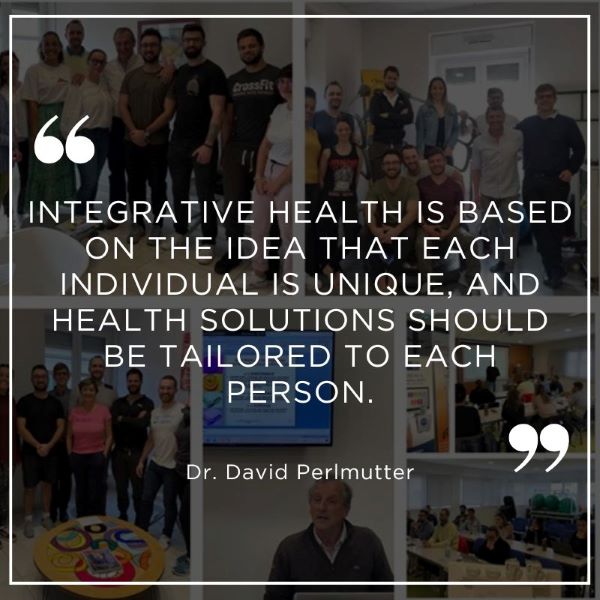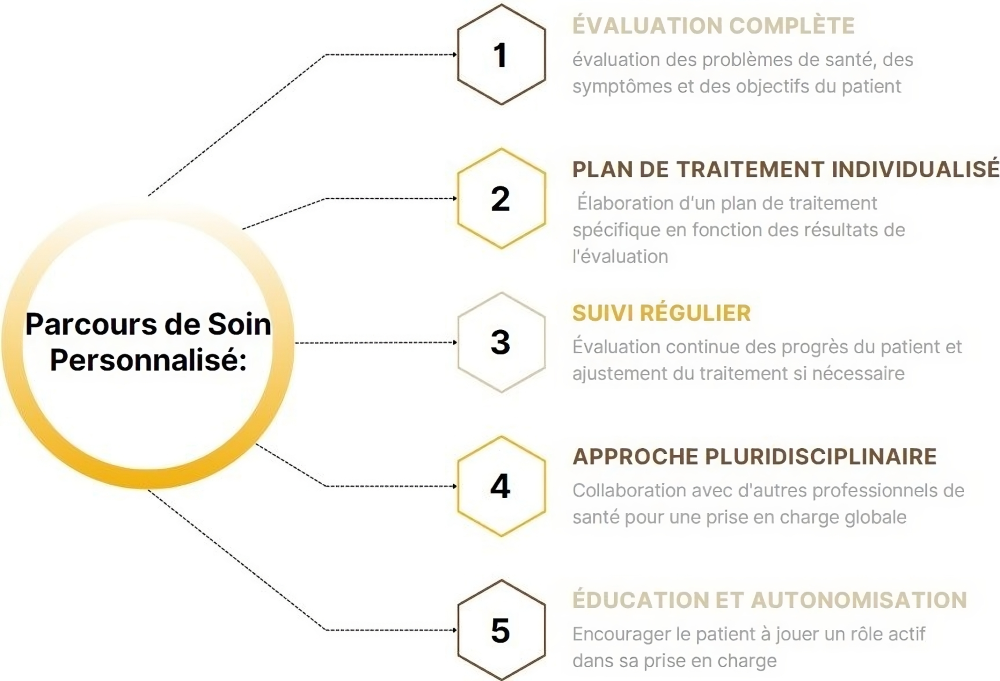
At the institute, care is comprehensive and personalized for each individual. It includes a personalized care path that begins with a thorough evaluation. This evaluation is designed to understand specific needs, provide a precise assessment of the situation, and highlight each individual's dynamic signature.
Subsequently, our team of professionals develops a personalized treatment plan that incorporates various therapeutic techniques based on rehabilitation, reathleticism, or improving physical condition objectives. Throughout the care, regular follow-up ensures progress evaluation, adjustment of work directions and the program as needed, providing continuous support.
We adopt a multidisciplinary approach by collaborating with other healthcare professionals as needed by the patient, ensuring comprehensive care. Throughout the care path, we emphasize patient education, providing information about their condition, self-management techniques, lifestyle adjustments, and preventive measures. This enables patients to make informed decisions about their health and promotes optimal recovery.

A thorough assessment is conducted to understand health issues and symptoms. It relies on medical history and patient objectives. This evaluation, through meetings with Physiotherapists and Educators in Adapted Physical Activities (E-APA), and using measurement tools, provides a precise assessment of the situation and determines treatment needs.
Based on the evaluation, a specific treatment plan is developed to meet the needs of each patient. This plan includes a combination of tailored therapeutic approaches, such as manual therapy, therapeutic exercises, physical modalities, and other complementary interventions.
The care path at Human Physio includes regular follow-up to assess patient progress, adjust treatment as necessary, and provide ongoing support. This optimizes results and ensures that treatment evolves according to the changing needs of the patient.
Our team of healthcare professionals and E-APA at Human Physio closely collaborates to offer a multidisciplinary and comprehensive approach. Depending on the patient's needs, this may include coordination with other external healthcare professionals, such as doctors, psychologists, and nutritionists, to ensure comprehensive care.
Throughout the care path, special attention is given to patient education. Information is provided about the condition, self-management techniques, lifestyle adaptations, and preventive measures. This allows the patient to play an active role in their own care and make informed decisions about their health.
"Pain, especially if it persists, gradually leads to a change in our behaviors that then impacts our functioning. Sooner or later, we may observe clinical signs highlighting increased sedentary behavior, isolation, or forms of loneliness, as well as a change in metabolism that can manifest as overweight or senescence in older individuals." D. Marc Lévêque.
In situations that often have not responded favorably to first-line care, a thorough interdisciplinary assessment is necessary, involving all healthcare stakeholders. Since 2014, the HumanPhysio Institute has been collaborating with other entities to treat patients with complex chronic diseases. This approach is based on an evaluation that then extends to an integrated care offering that includes biological, psychological, and functional aspects.
The biological, psychological, and functional evaluation is a comprehensive analysis that integrates different systems:
• The voluntary system (somatic nervous system) regulates conscious body functions and deliberate movements.
• Voluntary movements coordinate and execute deliberate movements by relaying sensory and motor signals.
• Sensory receptors send sensory information to the brain via sensory nerves, helping to perceive the environment and make decisions in response to stimuli.
• Conscious control directs deliberate body actions, such as moving an arm.
• The anatomical division consists of motor and sensory neurons, respectively transmitting signals from the central nervous system to muscles and sensory information to the brain.
• Conscious will guides actions resulting from conscious decisions, such as walking, talking, or raising a hand.
• Cognitive integration manages complex cognitive processes such as perception, attention, and decision-making associated with the cerebral cortex.
The Autonomous Nervous System (ANS), also known as the autonomic nervous system, regulates automatic body functions. Unlike the voluntary nervous system, it controls breathing, digestion, blood circulation, body temperature, and stress response.
• Dual innervation: Most internal organs are connected to both branches of the ANS, sympathetic and parasympathetic. These systems often act in opposition to maintain balance.
• Adaptation to changes: The ANS allows the body to rapidly adapt to environmental changes. For example, in the face of a threat, the sympathetic system prepares the body for action by accelerating heart rate, dilating pupils, and mobilizing energy reserves.
• Vital regulation: The ANS controls essential functions such as heart rate, respiration, blood pressure, body temperature, and digestion without requiring conscious control.
• Emotional response: The ANS plays a role in emotional response. For example, fear activates the sympathetic system, while relaxation and well-being are promoted by the parasympathetic system.
The Human Physio Institute offers an initial assessment and regular follow-ups, taking into account physical, emotional, cognitive, and psychological aspects to better understand health and guide a personalized treatment plan. This approach considers the complex interactions between different health domains, providing integrated care.

This component of the evaluation focuses on the physiological, physical, and biological aspects of the patient. This may include medical examinations, medical history, assessments of bodily functions (e.g., muscle strength, joint mobility, cardiorespiratory capabilities), and sometimes the need for laboratory analyses in collaboration with doctors.
This component evaluates the psychological and emotional aspects of the patient. This may include assessments of mood, anxiety, stress, sleep quality, cognition, and overall quality of life. Standardized assessment tools, clinical interviews, and questionnaires can be used to obtain accurate information.
Both physiotherapists and instructors in adapted physical activity are involved in this component. It evaluates the patient's functional limitations, i.e., how their condition affects their ability to perform daily, professional, social, and recreational activities. This may include assessments of mobility, endurance, coordination, balance, work capacity, and other specific functional areas.
"Pain, especially if it persists, gradually leads to a change in our behaviors that then impacts our functioning. Sooner or later, we may observe clinical signs highlighting increased sedentary behavior, isolation, or forms of loneliness, as well as a change in metabolism that can manifest as overweight or senescence in older individuals." D. Marc Lévêque.
In situations that often have not responded favorably to first-line care, a thorough interdisciplinary assessment is necessary, involving all healthcare stakeholders. Since 2014, the HumanPhysio Institute has been collaborating with other entities to treat patients with complex chronic diseases. This approach is based on an evaluation that then extends to an integrated care offering that includes biological, psychological, and functional aspects.
The biological, psychological, and functional evaluation is a comprehensive analysis that integrates different systems:
• The voluntary system (somatic nervous system) regulates conscious body functions and deliberate movements.
• Voluntary movements coordinate and execute deliberate movements by relaying sensory and motor signals.
• Sensory receptors send sensory information to the brain via sensory nerves, helping to perceive the environment and make decisions in response to stimuli.
• Conscious control directs deliberate body actions, such as moving an arm.
• The anatomical division consists of motor and sensory neurons, respectively transmitting signals from the central nervous system to muscles and sensory information to the brain.
• Conscious will guides actions resulting from conscious decisions, such as walking, talking, or raising a hand.
• Cognitive integration manages complex cognitive processes such as perception, attention, and decision-making associated with the cerebral cortex.
The Autonomous Nervous System (ANS), also known as the autonomic nervous system, regulates automatic body functions. Unlike the voluntary nervous system, it controls breathing, digestion, blood circulation, body temperature, and stress response.
• Dual innervation: Most internal organs are connected to both branches of the ANS, sympathetic and parasympathetic. These systems often act in opposition to maintain balance.
• Adaptation to changes: The ANS allows the body to rapidly adapt to environmental changes. For example, in the face of a threat, the sympathetic system prepares the body for action by accelerating heart rate, dilating pupils, and mobilizing energy reserves.
• Vital regulation: The ANS controls essential functions such as heart rate, respiration, blood pressure, body temperature, and digestion without requiring conscious control.
• Emotional response: The ANS plays a role in emotional response. For example, fear activates the sympathetic system, while relaxation and well-being are promoted by the parasympathetic system.
The Human Physio Institute offers an initial assessment and regular follow-ups, taking into account physical, emotional, cognitive, and psychological aspects to better understand health and guide a personalized treatment plan. This approach considers the complex interactions between different health domains, providing integrated care.
